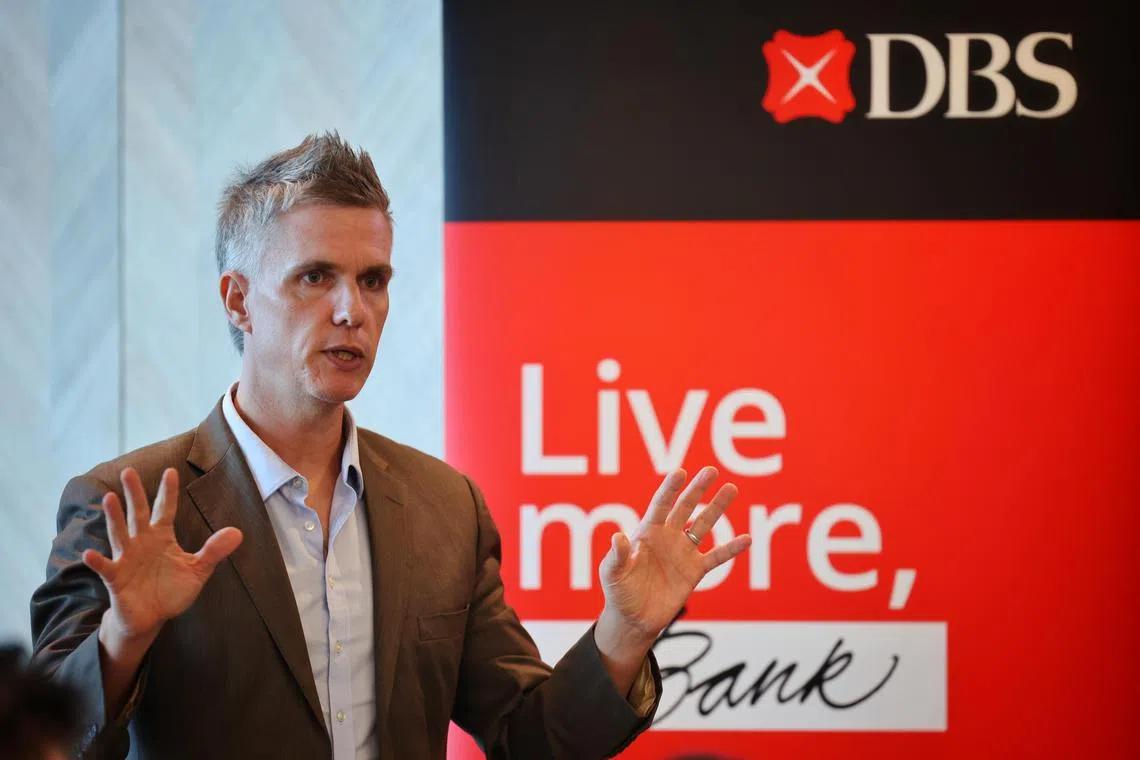Sustainability remains critical despite pullbacks from US banks: DBS
Sign up now: Get ST's newsletters delivered to your inbox

DBS chief sustainability officer Helge Muenkel said DBS will remain in the Net-Zero Banking Alliance, which is the global banking industry’s net zero target-setting group.
PHOTO: ST FILE
SINGAPORE - The tide appears to have shifted against sustainability, with US President Donald Trump pledging to withdraw from the Paris climate agreement
But globally and in Asia, sustainability is gaining momentum, and Singapore’s DBS Bank intends to continue addressing climate change as a core pillar of its broader sustainability strategy, its chief sustainability officer Helge Muenkel told The Straits Times on Jan 24.
He said DBS will remain in the Net-Zero Banking Alliance, which is the global banking industry’s net-zero target-setting group.
On Jan 8, it was reported that the six biggest banks in the US had quit the alliance as Mr Trump is expected to bring political backlash against climate action. They are JP Morgan, Citigroup, Bank of America, Morgan Stanley, Wells Fargo and Goldman Sachs.
But Mr Muenkel said the alliance serves as a valuable platform for collective action towards achieving net-zero emissions, particularly in an Asian context.
“As a leading bank in the region, we believe that enabling a just transition across Asia that balances environmental and socio-economic considerations is critical,” he said.
“Against this backdrop, fostering strong ecosystems and collaboration are essential to address the complexities of climate change.”
In an earlier interview with ST, Mr Muenkel said sustainability is the third “big mega wave” in the global economy, alongside the economic rise of Asia and rapid digitalisation.
“Sustainability is a risk imperative. The world is changing. We are rewiring our economies. We are rewiring our societies. That has an impact on almost everything that we do,” he noted.
For DBS, this is put into practice by taking into account environmental, social and governance (ESG) factors when doing due diligence on their customers, on top of traditional analysis such as for financial performance, management quality and credit worthiness.
But this does not mean that the bank simply rules out financing customers that are high carbon emitters or operate in carbon-intensive sectors.
“It’s a bit more nuanced, because you can provide a loan to a company that has high emitting assets or activities, and that can still be okay because we might help that company to become greener,” he said.
This can apply to companies in steel or cement production, for instance.
When asked how sustainability links to profitability, share prices and dividends, Mr Muenkel said making sustainability a key consideration will pay off in the long term, even if there is no direct way to link sustainability efforts to valuation for now.
“We firmly believe that... integrating sustainability into everything that we do, because it’s a risk imperative, because there are going to be business opportunities, will pay out over the long term,” he said.
Mr Muenkel added: “The time horizon is quite important. The longer the time horizon, the more conviction we all have that these efforts we do on sustainability will be good ultimately.”
He noted that as at end-2023, DBS has provided more than $70 billion in sustainable financing, which points to clients’ interest in green financing solutions.
DBS is also hiring people with expertise in sustainability, as it intends to integrate sustainability across the organisation, Mr Muenkel said.
The bank has hired for sustainability positions in the front office units, consumer banking group, and various risk departments.
When asked if the world is stepping back on climate efforts, Mr Muenkel examined the efforts of governments, the private sector, financial services companies and their overall progress on transitioning. While the data suggests the answer is “no”, he noted that there have been setbacks in these areas.
“But net-net, we can still credibly say that there’s still a lot of support and momentum,” he noted, pointing to some promising examples such as the deployment of renewable energy through electric vehicles.
Mr Muenkel noted that there might have been a little too much hype around sustainability a couple of years ago, but things are evolving.
“Now, we are at a healthy reflection. Climate science tells us what we need to do, and we need to be mindful of that. But I think there’s a healthy reflection of what can be done and what cannot be done. So there’s a sense of pragmatism.”
He also acknowledged how ESG has become a polarised, political discussion in the US.
“We live in a complex world. There are geopolitical issues, macroeconomic headwinds, there still is a cost of living crisis in many areas of the world and, because of all of this, there was also a bit of, especially in the US, an anti-sustainability movement,” he said.
In Asia, however, it is a different environment where there is still a lot of support from policymakers and regulators and positive momentum, Mr Muenkel noted.
“But what hasn’t gone away is the environmental and social challenges we have and how we need to balance this with economic questions.”
Ultimately, sustainability is for future generations and ensuring they get to live well too, he said.
“Sustainability is not about climate. Sustainability is about No. 1, people living well, and No. 2, future generations also living well.
“So we need to balance this, living well today, living well tomorrow. And climate is only one of the parameters.”
Sue-Ann Tan is a business correspondent at The Straits Times, covering capital markets and sustainable finance.



